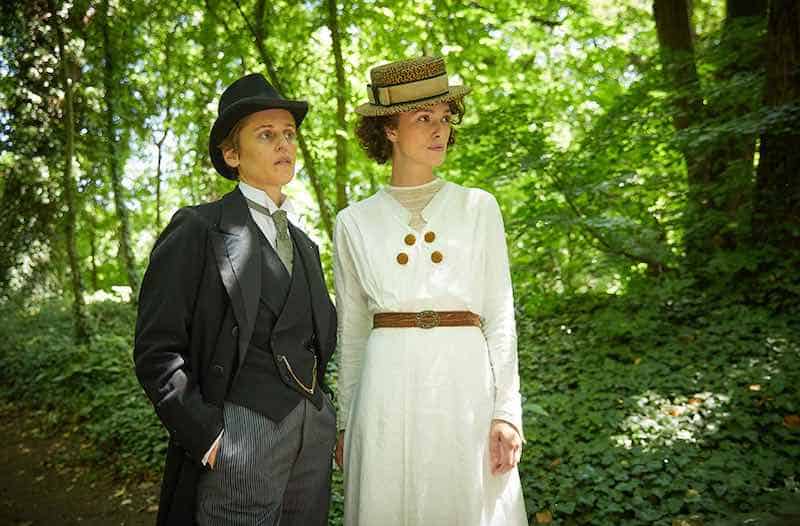For me, Colette was a mixed bag of good and bad. I still recommend seeing it, in spite of my less than 100% glowing review.
The things Colette did well, it did very, very well. There was Colette’s fight for freedom and autonomy in the days before feminism was a word. The attitude toward bisexuality, transgender acceptance, and sexual freedom was refreshingly liberated.

Keira Knightley as Colette and Dominic West as her husband Willy carried much of the film and both did an excellent job.
The costumes, the sets, the settings were all wonderful and evocative. The language was Americanized. There was no attempt at French accents.
The sex scenes were both modest and explicit, an interesting accomplishment on the filmmakers parts.
The things that bothered me were in the telling of Sidonie-Gabrielle Colette’s story. She was born in 1873 and died in 1954. The film covers the part of her life when she was married to Henry Gauthier-Villars AKA Willy, from 1893–1910.
This was when Colette discovered her gift for writing. Willy ran a writing factory. Several writers worked for him, and he published their work under his name. He claimed all the glory and paid his writers very little. When he started publishing his wife’s books, they became a huge success. The books made a fortune, which Willy quickly squandered.
The gaps in the story bothered me. When Colette discovered Willy’s infidelity, she confronted him, but apparently accepted it. When Colette mentioned that she was attracted to a woman, Willy accepted that. (He wouldn’t abide her being attracted to another man, however.) Their conversations about this were missing. There was no hint as to why they agreed on what we would now call an open marriage.
Did Colette and Willy talk out their marital relationship? Was it just what the French did? Was bisexuality really so accepted in early 20th Century France?
Both Colette and Willy were free to seek sex elsewhere. At one time they were both involved with the same woman, Georgie (Eleanor Tomlinson). Willy knew Colette was seeing Georgie. Colette didn’t know about Willy. This relationship triangle was useful in exploring Willy’s nature as a liar, a cheat, and a selfish bastard.

After discovering the truth about Georgie, Colette stopped being so willing to write for Willy and took to producing sexy cabaret shows with Wague (Dickie Beau) and Missy (Denise Gough). Wague was a flaming gay man. Missy dressed as a man. Colette referred to Missy using male pronouns. The days as a cabaret performer gave Colette a taste of earning her own way.
It was against the law for women to dress in men’s clothing in France then, but Missy apparently did it without problem.
Colette’s mother Sido (Fiona Shaw) and her new lover, Missy, urged her to break away from Willy. He took unfair advantage of her talent and gave nothing in return. The final straw came when Willy sold the rights to the very profitable books by Colette to his publisher, who would profit from them forever.
She left Willy, sought a divorce, and began writing under her own name. She lived with Missy for many years, according to the end credits. Yet reading Wikipedia, I see that she married twice more and had children. The movie gave the impression Colette stayed with Missy throughout the rest of her life and included photos of them in advanced years as proof.
Don’t let my annoyance with the missing logic of the story stop you from watching an excellent Keira Knightley in this sex-positive film about female empowerment and agency. Colette is one of the most famous authors of all time. It’s good to know more about her.
You can find the film on Amazon Prime, YouTube, and a couple of other streamers.
Discover more from Old Ain't Dead
Subscribe to get the latest posts sent to your email.

Regarding Colette:
The topic is interesting. The people behind this historical drama made a lot of effort to make us believe that we are in France around the year 1900:
** They tried to find some good locations
** The actors are dressed in clothes from this time
** They show us appropriate technology: an old train, an old card, etc.
** When we see the cover of a book, the title is in French
** When we see Colette writing in her notebook, the words she writes are French
But what happens when the characters start to speak? They speak English! A huge violation of historical truth.
The illusion that we are in France around the year 1900 is completely shattered.
This film is totally flawed. It does not deserve more than 2 of 5 stars. A rating of 40 per cent.
I thought it was off putting that she wrote in French but spoke in English, too. The film was for an American audience. I think the decisions around spoken language were based on their estimation of the American audience.
I think you are right when you say that the drama was designed for American viewers who are not used to subtitles. Nevertheless I think it is absurd to make a movie where French characters speak English.
The story is set in France. Obviously, a movie about Colette should be made with French actors who can speak the proper language.
Subtitles in English and other languages can be added for viewers who do not understand French and for viewers who are hard of hearing.
I do not understand why English actors would agree to play French characters. Having French characters who speak English is totally unrealistic.
A historical and biographical drama is supposed to be realistic. Not only with regard to what we see, but also with regard to what we hear.